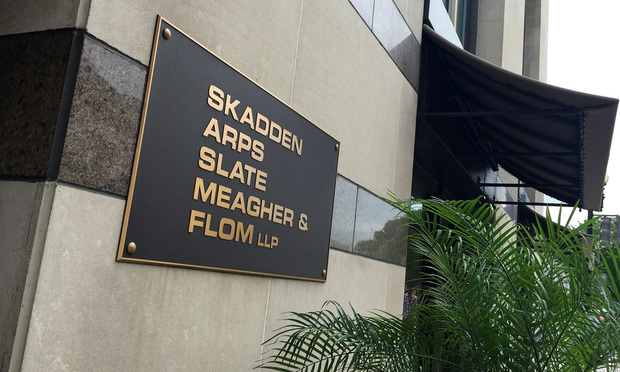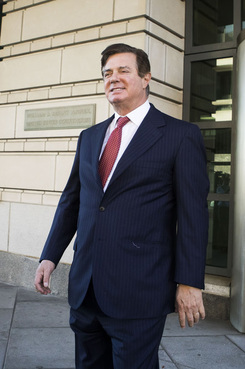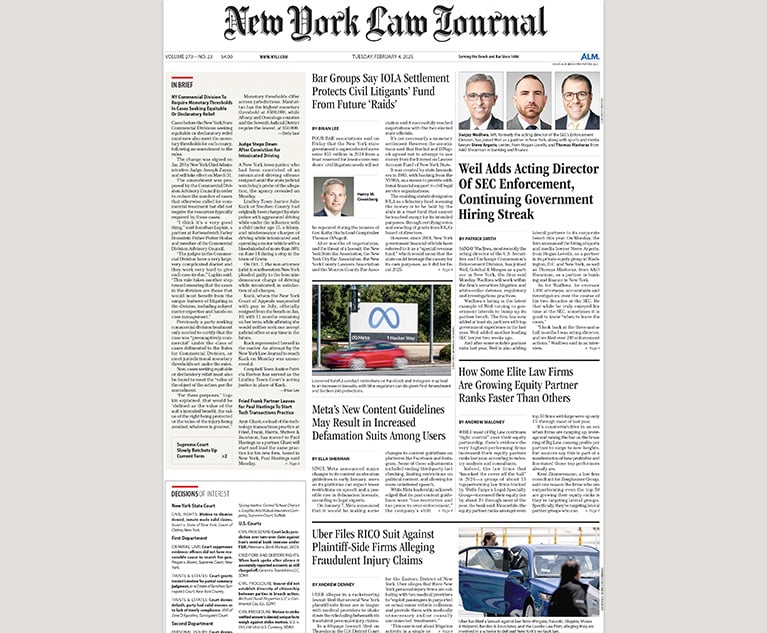Amid Manafort Mess, Skadden's Brand Shows Resilience
Former Skadden partner Gregory Craig's lawyers have said he was not required to register under FARA, but The New York Times reported this month that Craig remained under scrutiny for his role in Ukraine.
February 22, 2019 at 07:58 AM
6 minute read
The original version of this story was published on The American Lawyer
 Skadden, Arps, Slate, Meagher & Flom. Photo: Diego M. Radzinschi/ALM
Skadden, Arps, Slate, Meagher & Flom. Photo: Diego M. Radzinschi/ALM
For a firm whose media coverage is normally confined to the business pages, it's been a challenging year and a half for Skadden, Arps, Slate, Meagher & Flom.
The firm's decision to work with Paul Manafort on behalf of Ukraine's government beginning in 2012, and especially its failure to register under the Foreign Agents Registration Act for that work, set in place a chain of events leading to a stream of headlines—not to mention legal exposure—related to special counsel Robert Mueller III's prosecution of Manafort, President Donald Trump's former campaign chairman.
Skadden signed a settlement agreement with the Department of Justice in January resolving the agency's inquiry into whether the firm violated FARA, agreeing to pay the U.S. Treasury more than $4.6 million.
But beyond the legal implications, the question remains whether Skadden will face fallout from the constituency that matters most for the firm—purchasers of high-end legal services. And so far, any reaction on that front has been muted.
The January settlement capped an extraordinary period for Skadden, which, with $2.58 billion in 2017 revenues, takes in more cash than all but four law firms in the country.
The negative headlines related to Manafort and Ukraine began appearing in the fall of 2017, reaching their first crescendo in February 2018, when former associate Alex van der Zwaan pleaded guilty to lying to investigators in the Mueller probe over his contacts with former Trump campaign aide Rick Gates. The Dutch attorney was jailed for 20 days and deported to the Netherlands in June.
The press attention continued when former White House counsel Gregory Craig resigned from the firm in April, after his work on behalf of the Ukraine's Ministry of Justice came under fire, and spiked again when the firm reached its deal with the DOJ, acknowledging it was required to register with FARA in 2012.
 Paul Manafort leaving federal court in Washington, D.C., Nov. 2, 2017. Photo: Diego M. Radzinschi/ALM
Paul Manafort leaving federal court in Washington, D.C., Nov. 2, 2017. Photo: Diego M. Radzinschi/ALMProsecutors later said that the law firm failed to disclose that in addition to being retained to write a report evaluating the trial of Yulia Tymoshenko—the political rival of one of Manafort's top clients, former Ukrainian President Viktor Yanukovych—it was also representing Ukraine itself. While the firm's contract with Ukraine's Ministry of Justice, which was made public, showed that it was to earn approximately $12,000 for the work, Skadden understood that a Ukrainian business person would actually be paying its fees, which amounted to over $4.6 million.
A spokeswoman for Skadden did not provide comment for this story, but at the time of the January settlement, the firm said the agreement brought “closure with the U.S. government regarding issues relating to a report we produced for the Government of Ukraine in 2012.”
Nevertheless, the fate of former Skadden partner Craig, a onetime Williams & Connolly partner who also spent time in the Clinton White House before becoming Barack Obama's White House counsel, remains uncertain. Craig's lawyers have said he was not required to register under FARA, but The New York Times reported this month that Craig remained under scrutiny for his role in Ukraine.
Yet, in spite of Skadden's proximity to the all-consuming Mueller probe, several experts said long-term damage to the firm's reputation is likely to be minimal.
Scott Sobel, senior vice president of crisis and litigation communications at kglobal, suggested that for clients, it makes little difference if the firm's original actions were the result of a calculated risk equation, an oversight or a misjudgment.
“High-profile purchasers of legal services know how messy intricate cases and high-profile client representations can get, so they probably judge a law firm's reputation by how well the firm handles the issue, and aren't as influenced as much by the firm being accused of misdeeds in the first place,” he said in an email.
Sobel continued: “Great law firms are problem solvers, and it is good for their reputation if they handle their own problems effectively. Clients want to be represented by a firm like Skadden that is able to, quickly and as painlessly as possible, get out of a mess and not dig itself deeper into a reputational pit.”
In the end, suggested Zeughauser Group consultant Kent Zimmermann, any impact on the firm's image in the market is likely to be short-lived and superficial.
“I think that any preeminent firm, known for top quality in its areas of focus, is unlikely to have the strength of its brand or its long-term trajectory changed by a mistake that maybe one of its lawyers made,” Zimmermann said.
Those impressions are bolstered by a survey released last week by law firm marketing consultancy Acritas that found Skadden's brand actually improved in 2018 in the eyes of legal service purchasers.
Skadden, which led the survey in the first half of the decade, made up significant ground on leader Jones Day in the latest assessment. And this wasn't a result of Acritas' research predating the firm's public exposure. The company's telephone surveys with top legal buyers started in January 2018 and extended through December.
So even before Skadden had cut its deal with the DOJ—a maneuver praised by both Zimmerman and Sobel for the firm's swift acceptance of responsibility— its standing in certain quarters had been on the rise.
That response is likely not universal, cautioned law firm crisis expert Gina Rubel, founder and CEO of Furia Rubel Communications Inc. She emphasized that when any law firm, small or large, becomes embroiled in an issue involving politics, onlookers and potential clients' political commitments will likely shape their reaction. Some may simply steer clear of an association with anything political.
“Reputation is all in the eyes of the beholder,” Rubel said. “Some companies want a firm with Skadden's legal prowess, and will respect their brand recognition and depth of contacts despite the media attention. Others will see it as a deterrent.”
Read More
Experts See Few Parallels as Skadden's Ukraine Work Comes Under Fire
Mueller's Interest in Skadden Presents Unique Crisis Management Challenge
This content has been archived. It is available through our partners, LexisNexis® and Bloomberg Law.
To view this content, please continue to their sites.
Not a Lexis Subscriber?
Subscribe Now
Not a Bloomberg Law Subscriber?
Subscribe Now
NOT FOR REPRINT
© 2025 ALM Global, LLC, All Rights Reserved. Request academic re-use from www.copyright.com. All other uses, submit a request to [email protected]. For more information visit Asset & Logo Licensing.
You Might Like
View All

How Some Elite Law Firms Are Growing Equity Partner Ranks Faster Than Others
4 minute read
Law Firms Expand Scope of Immigration Expertise Amid Blitz of Trump Orders
6 minute readTrending Stories
- 1Mastering Litigation in New York’s Commercial Division Part V, Leave It to the Experts: Expert Discovery in the New York Commercial Division
- 2GOP-Led SEC Tightens Control Over Enforcement Investigations, Lawyers Say
- 3Transgender Care Fight Targets More Adults as Georgia, Other States Weigh Laws
- 4Roundup Special Master's Report Recommends Lead Counsel Get $0 in Common Benefit Fees
- 5Georgia Justices Urged to Revive Malpractice Suit Against Retired Barnes & Thornburg Atty
Who Got The Work
J. Brugh Lower of Gibbons has entered an appearance for industrial equipment supplier Devco Corporation in a pending trademark infringement lawsuit. The suit, accusing the defendant of selling knock-off Graco products, was filed Dec. 18 in New Jersey District Court by Rivkin Radler on behalf of Graco Inc. and Graco Minnesota. The case, assigned to U.S. District Judge Zahid N. Quraishi, is 3:24-cv-11294, Graco Inc. et al v. Devco Corporation.
Who Got The Work
Rebecca Maller-Stein and Kent A. Yalowitz of Arnold & Porter Kaye Scholer have entered their appearances for Hanaco Venture Capital and its executives, Lior Prosor and David Frankel, in a pending securities lawsuit. The action, filed on Dec. 24 in New York Southern District Court by Zell, Aron & Co. on behalf of Goldeneye Advisors, accuses the defendants of negligently and fraudulently managing the plaintiff's $1 million investment. The case, assigned to U.S. District Judge Vernon S. Broderick, is 1:24-cv-09918, Goldeneye Advisors, LLC v. Hanaco Venture Capital, Ltd. et al.
Who Got The Work
Attorneys from A&O Shearman has stepped in as defense counsel for Toronto-Dominion Bank and other defendants in a pending securities class action. The suit, filed Dec. 11 in New York Southern District Court by Bleichmar Fonti & Auld, accuses the defendants of concealing the bank's 'pervasive' deficiencies in regards to its compliance with the Bank Secrecy Act and the quality of its anti-money laundering controls. The case, assigned to U.S. District Judge Arun Subramanian, is 1:24-cv-09445, Gonzalez v. The Toronto-Dominion Bank et al.
Who Got The Work
Crown Castle International, a Pennsylvania company providing shared communications infrastructure, has turned to Luke D. Wolf of Gordon Rees Scully Mansukhani to fend off a pending breach-of-contract lawsuit. The court action, filed Nov. 25 in Michigan Eastern District Court by Hooper Hathaway PC on behalf of The Town Residences LLC, accuses Crown Castle of failing to transfer approximately $30,000 in utility payments from T-Mobile in breach of a roof-top lease and assignment agreement. The case, assigned to U.S. District Judge Susan K. Declercq, is 2:24-cv-13131, The Town Residences LLC v. T-Mobile US, Inc. et al.
Who Got The Work
Wilfred P. Coronato and Daniel M. Schwartz of McCarter & English have stepped in as defense counsel to Electrolux Home Products Inc. in a pending product liability lawsuit. The court action, filed Nov. 26 in New York Eastern District Court by Poulos Lopiccolo PC and Nagel Rice LLP on behalf of David Stern, alleges that the defendant's refrigerators’ drawers and shelving repeatedly break and fall apart within months after purchase. The case, assigned to U.S. District Judge Joan M. Azrack, is 2:24-cv-08204, Stern v. Electrolux Home Products, Inc.
Featured Firms
Law Offices of Gary Martin Hays & Associates, P.C.
(470) 294-1674
Law Offices of Mark E. Salomone
(857) 444-6468
Smith & Hassler
(713) 739-1250







